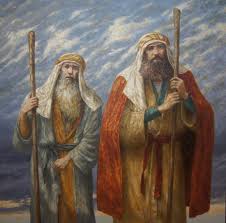Moses and Aaron Brought Together
all the Elders of the Israelites
4: 27-31
Moses and Aaron brought together all the elders of Isra’el. DIG: As one of the elders of the Israelites hearing Moses and Aaron for the first time, how would you respond?
REFLECT: Do you believe that God is concerned about you and has seen your misery? How do you respond to that knowledge?

Then ADONAI said to Aaron who had been in Egypt for forty years while Moses was in Midian: Go into the desert to meet Moses. So he met Moses at the mountain of God, Mount Sinai, where Moses had the experience of the burning bush, and kissed him (4:27). This was and is a common greeting in the Near East. Here were two brothers, who had been separated for forty years, were brought together once again to do God’s will. Moses knew that Aaron was on his way and Aaron knew that Moses was coming to meet him. Then Moses told Aaron everything that ADONAI had sent him to say, and also about all the miraculous signs he had commanded him to perform (4:28). On his part, Aaron would tell of the old home, of the passing away of the generation to which they belonged, of their sister Miriam, of his own marriage and children, and especially of the gathering shadows and deep anguish of his people. Then the two brothers set off for Egypt.
Once Moses and Aaron arrived, they brought together all the elders of the Israelites and Aaron, as Moses’ spokesman, told them everything ADONAI had said to Moses (4:29-30a). There he told them of the strange story of his rescue from the Nile, of his adoption by Hatshepsut, and of his rejection of all that Egypt stood for. He told them of his murder of the Egyptian and his fleeing to Midian. Nothing had been heard of him for forty years. Even his own family was ignorant of what had become of him. That he had fled from the wrath of Thutmose III was well known, but his life in the desert was not. It was eerie to be face to face with one of whom they had heard so much.72 Then Moses and Aaron told the elders of the Israelites about the burning bush and the delivery of the nation of Isra’el, but the elders did not believe them. This lack of faith would be a motif that would repeat itself over and over again with the nation of Isra’el.
Therefore, Moses performed the three signs before the people (4:30b). First, he turned his staff into a snake. The fact that he had to perform all three miraculous signs (to see link click Au – Put Your Hand Inside Your Cloak) indicates that one was not enough for them to be convinced. The LORD had anticipated the people’s lack of faith, and therefore He gave Moses the second sign; he turned his own hand leprous and returned it to normal again. God then said: If they do not believe you or pay attention to the first miraculous sign, they may believe the second. But if they do not believe these two signs or listen to you, take some water from the Nile and pour it on the dry ground. The water you take from the river will become blood on the ground (4:8). Apparently not even two signs were enough for these people who were living by sight, so Moses then turned water into blood. Lack of faith becomes a major theme of Exodus and their wilderness wanderings. They lived by sight and not by faith.73
Finally, after seeing all three miracles, they said they believed what Moses had said to them (4:29-31a). But we will see that their faith lasted only as long as they had no opposition. And when they heard that ADONAI was concerned about them and had seen their misery, they bowed down and worshiped (4:31b). What a gathering that must have been! It was probably held under the shadow of night, at some secluded spot in the heart of Goshen. Quietly, probably by ones and twos, the gray beards of God’s oppressed people gathered with one whom they had probably heard of, but had never seen.
Here we are introduced to the true nature of the confrontation in Egypt. It was not merely a hostile engagement between the two earthly nations of Egypt and Isra’el. Neither was it a conflict between Moses and Pharaoh, or between Moses and the magicians of the court of Pharaoh. There was much more at stake. The conflict was between the God of Isra’el and the god of Egypt, or Pharaoh. Rabbi Sha’ul spoke of this in Ephesians 6:12 when he said: For our struggle is not against flesh and blood, but against the rulers, against the authorities, against the powers of this dark world and against the spiritual forces of evil in the heavenly realms. Therefore, the book of Exodus shows us much more than a national struggle against oppression. It is really about spiritual warfare.74



Leave A Comment